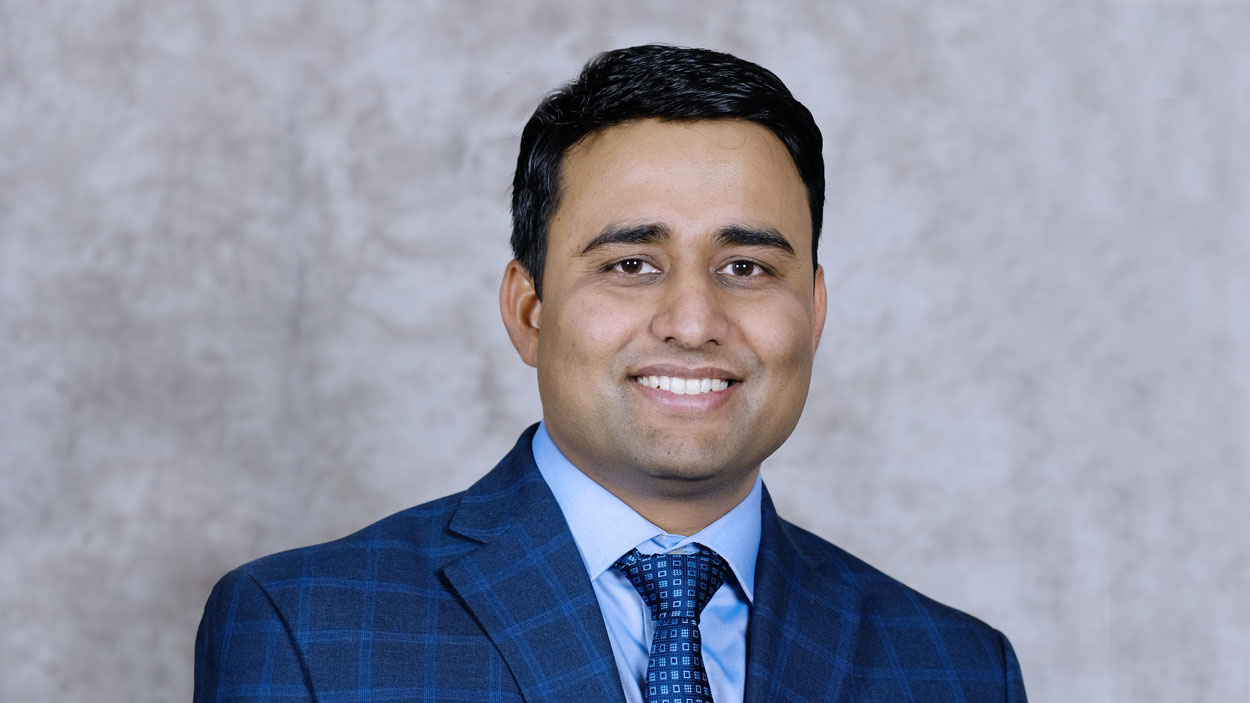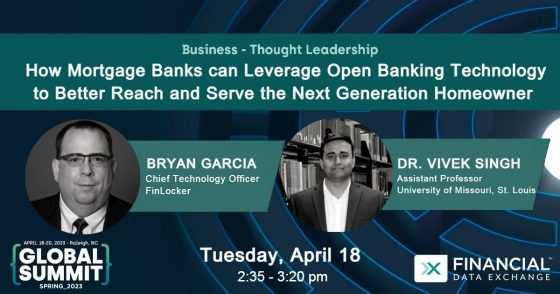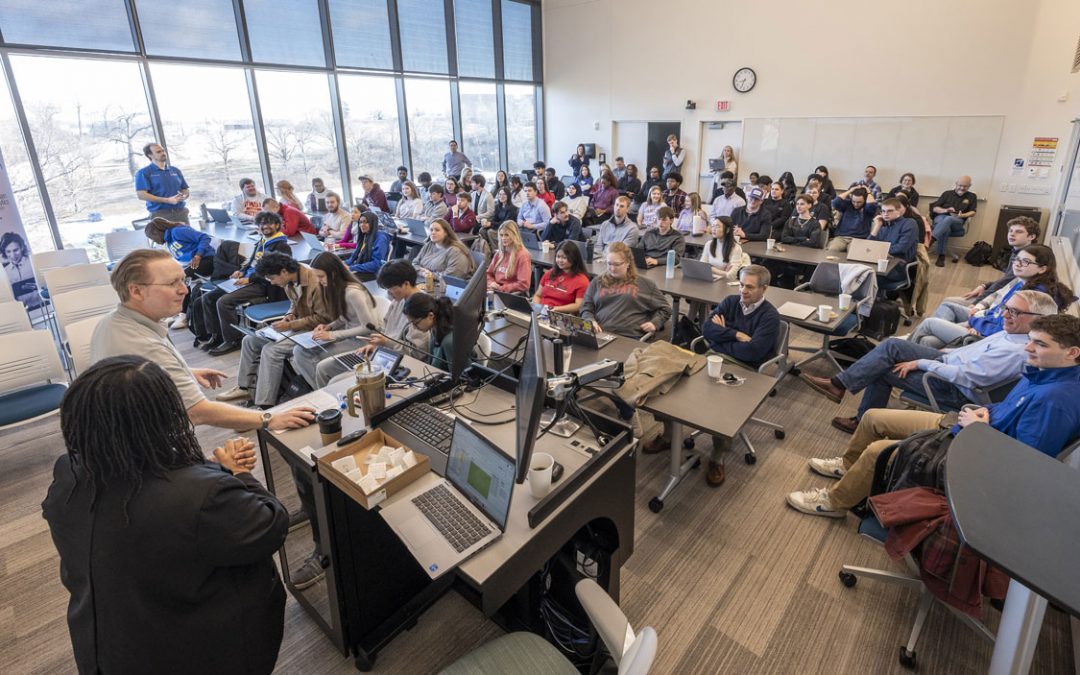
Vivek Singh, an assistant professor in the Department of Information Systems and Technology, has been collaborating with colleagues from FinLocker on research into emerging AI technologies, helping them discover ways they can apply them to the financial technology company’s platform. (Photo by August Jennewein)
FinLocker is a financial technology company based in Clayton, Missouri, that aims to help consumers prepare for a mortgage and sustain homeownership.
Since 2014, FinLocker has been helping mortgage lenders, banks, credit unions and other financial service providers improve the financial fitness of their consumers. Using consumer-permissioned data and leveraging AI and machine learning, the FinLocker platform aggregates and analyzes each consumer’s financial data to provide them with the status of their mortgage eligibility, insights into their spending history, trackable goals and budgets, cash flow analysis, and recommended actions to overcome their financial challenges to qualify for a mortgage.
FinLocker is constantly looking for ways to enhance the features and performance of its product by incorporating the latest technology. However, with a lean full-time team, they sought an external technology research collaboration and found one in Vivek Singh, an assistant professor in the Department of Information Systems and Technology in the College of Business Administration at the University of Missouri–St. Louis.

FinLocker Chief Technology Officer Bryan Garcia and UMSL Assistant Professor Vivek Singh presented their work together at the 2023 Financial Data Exchange Global Summit last April in Raleigh, North Carolina. Garcia and Singh jointly published a paper titled, “How Mortgage Banks can Leverage Open Banking Technology to Better Reach and Serve the Next Generation Homeowner.” (Graphic courtesy of Vivek Singh)
“We’re a very small company, so we don’t have a research department,” said Bryan Garcia, the chief technology officer at FinLocker. “Dr. Singh has really helped us narrow down areas that might be useful from a research point of view. He brings creative ideas to the table, helps us think about how we can approach a problem differently and lets us know, ‘Here are the things that are going on in academia that we may not be thinking about.’”
Garcia and Princewill Okorie, a machine learning engineer with FinLocker, have been able to explore emerging AI technologies with Singh and discover ways to apply them to the company’s platform.
The collaboration isn’t just benefiting FinLocker. It also supports Singh’s research into applications of automated machine learning and generative artificial intelligence.
“In information systems, and in general in business schools, we are very practice-oriented,” Singh said. “We generally look for new ideas from outside, and we take those ideas and build based on our academic expertise. In that way, it really helps me to know what the practitioner challenges that companies like FinLocker are facing when they are trying to adopt AI or machine learning.
“With generative AI applications, like ChatGPT, how can these technologies help companies like FinLocker and other organizations in the region? That’s what I learned from interactions with Bryan, Princewill and their team.”
Singh’s collaboration with Garcia and FinLocker began in the latter half of 2020, following an introduction by Dinesh Mirchandani, professor and chair of the Department of Information Systems and Technology.
Garcia, who has been a member of UMSL’s IST Advisory Board since 2010, had expressed to Mirchandani an interest in partnering with someone on the faculty and gave him an overview of what he was envisioning. Singh jumped at the chance.
“Dr. Singh has been very willing to explore things that may be slightly different from his particular research goals are,” Garcia said.
Singh, meanwhile, has several manuscripts under development based on research he’s done through his work with FinLocker.
Last April, at the Financial Data Exchange Global Summit in Raleigh, North Carolina, Singh and Garcia presented a paper they jointly published, “How Mortgage Banks can Leverage Open Banking Technology to Better Reach and Serve the Next Generation Homeowner.”
The partnership has also opened opportunities for two of Singh’s graduate research assistants – Kenichi Segawa and James Tao – who participated in internships with FinLocker. Both gained practical knowledge about real-world applications of cloud technology and work experience that gave them a leg up when it came time to hit the job market after they completed their master’s degrees.
“The FinLocker project helped me to understand the fundamentals of machine learning being used in fintech, where I utilized my in-class data analytics and data mining knowledge in a real workplace environment,” said Tao, now an integration analyst at Charter Communications. “The experience also boosted my career prospects to a different level by understanding how information technology impacts business decisions.”
Segawa, now a cloud solution architect with Microsoft, said the experience enhanced his skills and got him excited about machine learning-driven solutions.
“Witnessing how machine learning can transform real-world business scenarios, particularly in the finance technology domain, was both enlightening and impactful,” Segawa said.
Singh sees the collaboration with FinLocker continuing, and he hopes it will allow more students to gain valuable real-world learning experiences in the future.














